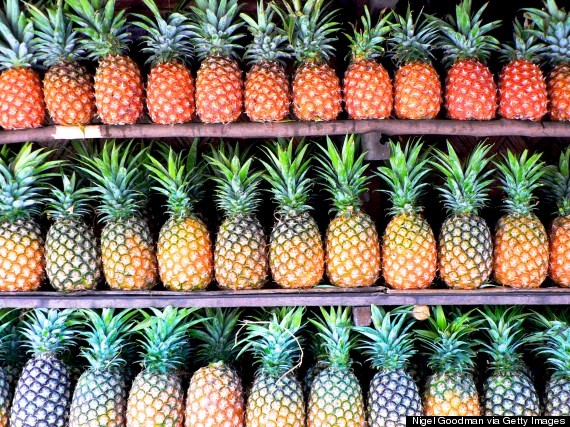
Pineapple ready for sale. The local and international market is a glowing opportunity for Kenyan pineapple farmers. Photo by Huffington Post.
The suppressed production of pineapples for the local and international market is driving the high demand, promising good returns to farmers.
A medium sized pineapple costs about Sh955 in a supermarket in Israel, a fruit that costs less than Sh60 in Kenya.
The country imports at least 500 tonnes to compliment the about 3,000 harvested in the few farms in Israel, according to Fresh Plaza.
The online fresh produce marketplace identifies had growing condition in the country as the main reason for farmers to shy away from that crop. There are about 300 acres owned by not more than 30 growers.
Although the fear of importing fresh produce with other diseases poses a threat to Israel, Selina Wamucii reports that the country remains a fertile market for Kenya to fill the gap together with Guatemala and South Africa.
That is why Selina Wamucii, a fresh export company, works with small holder farmers to give healthy produce for the export market that has been rising from the second half of 2016.
The company points out to Middle East and the US as other markets interested in the Kenyan produce of pineapples, with China joining in the competition as the fresh fruits demand rise the Far East country.
READ ALSO: Kenya at a good place to bridge France's dire need of pineapples
READ ALSO: High demand for Kenya's passion fruit in Belgium
READ ALSO: Fresh cucumber market opens up in Israel
Cayenne is the most preferred variety because of its aroma and distinct taste.
Locally, Busia towns is offering the highest price for the produce – Sh1,300- for a dozens of fruits weighing about 13kgs. In Nairobi, the same quantity fetches Sh1,170 while Mombasa pays Sh900 in wholesale.
Pineapples do well in light soils rich in manganese, which is one of the mineral nutrients that give the fruit its anti-oxidation property.
The demand has been rising locally and internationally as it is consumed as a salad.
Besides vitamin C and B, the fruit is a tenderiser, a quality that makes it one of the most preferred fruit after a heavy meat meal, according to San Diego Nutritionist Laura Florence.
That is why eating too many pieces of the fruit causes the mouth to be tender, while the tongue feels like it is cracked.
Its high fibre content also helps in digestion,
















Comments powered by CComment